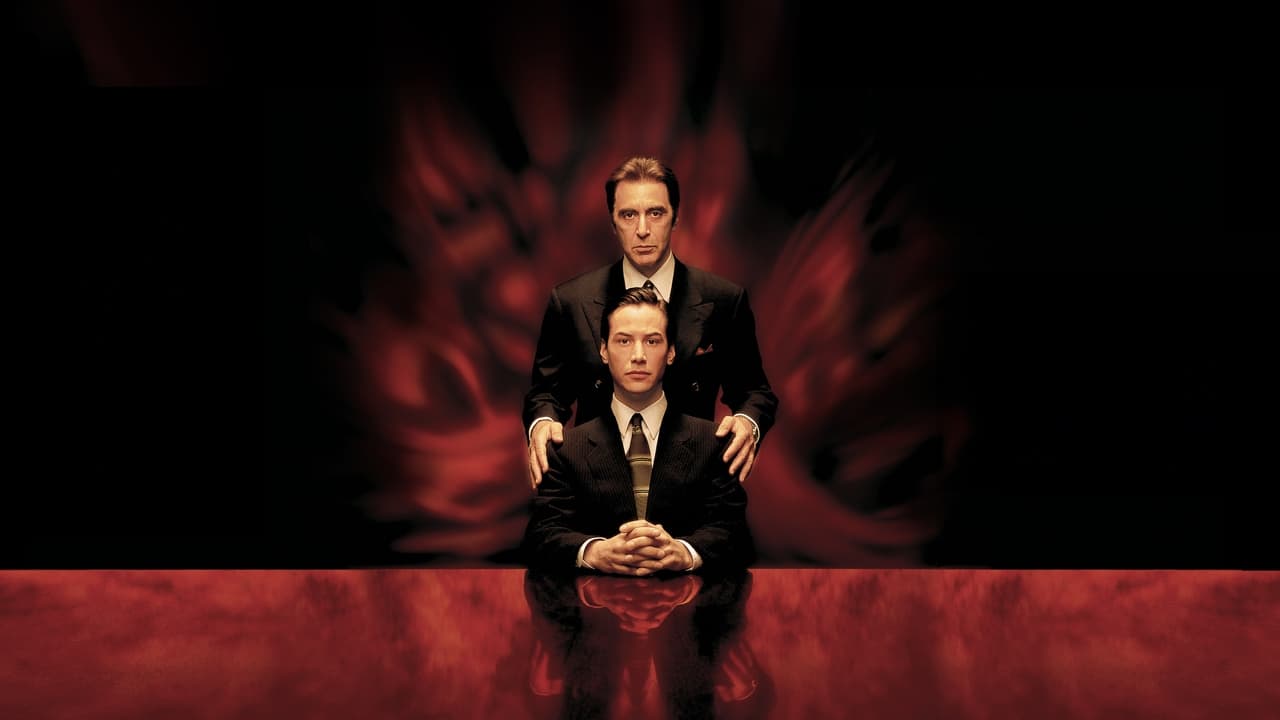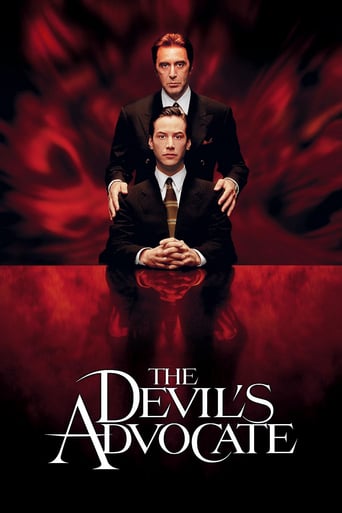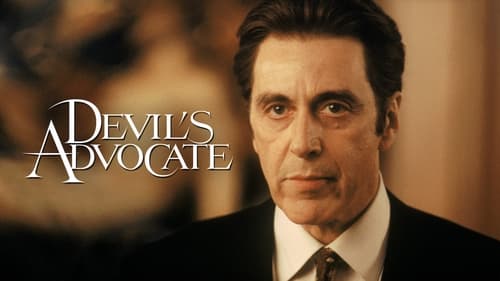



Overrated and overhyped
just watch it!
Dreadfully Boring
A great movie, one of the best of this year. There was a bit of confusion at one point in the plot, but nothing serious.
View More"Can you imagine a world without lawyers?" The mere thought of happy people from all over the world dancing hand-in-hand in circle around a beautiful rainbow sent an immediate shiver down Lionel Hutz' spine. This classic moment from "The Simpsons" pretty much sums up the connection people make between lawyers and evil. How can there be anyone making loads of money from a job that basically consists on raising doubt over the guilt of child molesters or war criminals? Of course, lawyers are the reincarnations of the devil! There's an ethical bunch that defends the widow and the orphan but Taylor Hackford makes no secret that his devil's advocate is no Atticus Finch.And Kevin Lomax, played by an underrated Keanu Reeves, is a hot-shot with as much ethics as Lionel Hutz. A young girl is just testifying against her teacher, Lomax sees his own client caressing his crotch, there's no doubt in his mind that the man is filth, his conscience is shaken so he asks to go to the bathroom, but when he comes back, you understand that it was just a moment of weakness, not realization. He knows exactly how to handle the situation and through a habile cross-examination, he gets the pedophile acquitted. Yet, we never really deem Lomax as a bad man, there's something about this young go-getter that doesn't fuse villainous vibes or the conviction that his cockiness will backfire at him, and that's integral to the film's appreciation. If we believed at the spot that he was the bad guy, the Faustian pact wouldn't have any dramatic weight.The film set him up as a Florida prodigy who never lost a case, his secret is a sixth sense that allows him to pick the right jury for the job, which is impressive enough to raise itself beyond 'evil' stereotyping. As for his background, he's a man who grew up without any father-figure (which excuses his cynicism), raised by a mother (Judith Ivey) whose devotion to religion feels more like overcompensation than bigotry, and married to a lively and beautiful girlfriend remarkably played by Charlize Theron. His last victory earns him a contract in a prestigious lawyer's cabinet in New York, he demonstrates his jury-picking skills and manages to win an unsolvable case, and in the process a high firm position in the cabinet. The film tells the wags-to-riches story with such gusto and an amazing attention to details highlighting wealth and power than we kind of enjoy it without really waiting for any supernatural elements. As a matter of fact, the title is a bit of a give-away.Indeed, is it spoiling the film to say that Al Pacino is the Devil? A simple look at the poster and a game of elimination will get you to the conclusion. And when John Milton, the CEO, makes his entrance, shakes hands with Lomax and takes him to the top of the building, where a sort of pool has been designed so that it looks like the edge of Niagara falls, we get an eloquent metaphor for Lomax' situation, like walking on a tightrope, with a man who can either take him to the summit or cause his downfall. Hackford's film is visually eloquent and creates such intriguing build-ups that the early jump scares are efficient. But as powerful as they are, a few of them aren't anticipated, and the film ventures in a territory we identify as familiar since we know the title and the main theme. It's not like Alan Parker's "Angel Heart" which starts like a film-noir before descending into horror.But there's a certain delight within the anticipation of the thrills to come and to see poor Lomax' always only one step behind his wife until it hits him in the face. The escalation toward more and more disturbing revelations culminates with one of these moments where you realize that none other than Al Pacino can make the devil look so flashy and entertaining. De Niro was a creepy devil, but Pacino's angle is perfect for the film, he's a man who goes over the top, histrionic since that's a skill required for his job. That's the trick lawyers use and the essence of the devil, it doesn't guide you much as it whispers in your head all you need to make the wrong moves by yourself, it's all in pretending, in masking emotions and guiding the others through the desired reactions. It's all about spotting the Achille's heel and in Lomax' case, by his own admission, his ego is his biggest weakness, Vanity is his sin and for a puppeteer like Milton, it's the easiest string to pull.This revelation, while not a twist, reveals why we gave him the benefit of the doubt by pinpointing his real sin, through a flamboyant and operatic showdown between Lomax and Pacino who got (of course) the best lines and a few fiery tirades, to which Reeves reacts perfectly as the straight-man. While not reinventing the codes or providing anything in the same vein than "Rosemary's baby" or "The Exorcist", "The Devil's Advocate" is less interested in providing horror thrills than revealing the depths of human propensity to endorse horror, and all in flash, a few substance, and some jump scares worthy of the best thriller.
View MoreThis movie is about a very successful Florida lawyer who hasn't lost a case since he started, played by Keanu Reeves, when he gets the chance to go work for a big lawyer companyGoing into this movie, I expected something very different from what I got. It wasn't quite clear what the movie was going for. The scenes feel very rushed and most of them don't really serve a purpose. The first and the second part also felt very separate from each other. The first part felt more like a biopic, while the second part got glimpses of a psychological thriller. Only until the very (second to) last scene the movie revealed it's underlying message, but by then for me it was already ruined. The performance felt a bit choppy for me, especially Keanu Reeves got on my nerves with some serious overacting. He also had something really irritating about his voice. Also Charlize Theron's character was just plain stupid, she had no personality whatsoever and you don't really care for their relationship. (It even annoys you a bit at times) The one bright spot in this whole movie is the performance of Al Pacino though. Every minute he's on screen he demands all the attention, and while you get from the beginning that he's not really very reliable, you do however enjoy every scene he's in because it really looks like Pacino is just having a fun time. Pacino has some great monologue moments in this moments, and all the credit goes to him because he didn't really have so much to work with, but somehow he made it click.That's however the only really enjoyable part in the movie, because what's left is really just a hot mess. The editing feels very choppy and rushed, like already mention the dialogue is very dull and you don't really know where this movie is going or what it wants to be. It is blunt and too subtle at the same time. Sometime the movie wants to make something clear so bad that it just looks absolutely ridiculous while at other times you don't really get what the movie is trying to tell you. Having said that however, I do think if you see this movie twice, you Will get a bit more satisfaction over it if you do decide to concentrate on the underlying tone. It is pitiful however that you only can get grasp of the tone of the movie at the end of the movie. (The last monologue of Pacino is undoubtedly the thing that elevates this movie) I don't think anyone would really care to see it a second time to be honest, because you would have lost you attention for the movie long before the first watching even ends 5,5/10 verdict: A hot mess
View MoreAl Pacino I have to say, was absolutely brilliant at playing as Satan/Milton. He was just so funny when he admitted to Keanu Reeves' character Lomax that he was was the devil in the end. His attitude and corniness would definitely make you laugh honestly. You wouldn't realise what a best actor he is!Anyways I thought the movie was very good, I was annoyed that I miss midway of it because I forgot that my tablet was running, while I was out. So yeah, it's a bummer but sure, at least I didn't mess the best ending part! I'm glad the movie has got a great lineup of well known cast such ad: Charlize Theorn, Keanu Reeves, Craig T. Nelson and of course Pacino himself! It made the movie looking swell for a devil movie!
View MoreSelf-reflexivity in artistic works serves to remind the audience that they are viewing a cultural product. It prevents their becoming so involved in the text that they do not think critically about the message. The presence of the mirror during various scenes of The Devil's Advocate serves as a self-reflexive device to highlight the major themes of the film, namely duality, free will and truth. These important mirror scenes propel the plot action to Kevin's ultimate downfall and rebirth.The mirror first appears during the Gettys trial when Kevin is faced with a crossroads. He faces his reflection, and negotiates with himself in the mirror. The duality of seeing both him and his reflection highlights a struggle between good and evil. While Kevin sells his soul (ethic and morals) and makes his pact to keep his record clean, he does not wear his wedding ring. This recalls previous texts in which marriage is an institution frowned upon by the Devil. The sinking sound of the toilet flush and thunder with the rip of the paper towel further emphasize this crossroads scene. His decision to defend Gettys despite his knowledge highlights his pride. He is unwilling to lose a case and mar his unblemished record. The mirror sequence underscores his decision which propels the action forward, whereby Milton takes notice of him and lures him to New York.When Kevin meets Milton, the two are reflected in a man-made lake on the rooftop. The body of water often symbolizes the unconscious and deep, submerged truths. This scene foreshadows the final climax when Milton reveals that he is Kevin's father and that he values man-kind above all else. At this mirror/reflection scene Milton asks "you don't really want to go back to Florida, do you?" and Kevin decides he does not. This decision, emphasized by the mirror, propels the action again by allowing Mary Anne and Kevin to move to New York despite his mother's warnings. This is another crossroads, a time when he could have resisted his egotism.For Mary Anne, the mirror does not emphasize a crossroads, but truth. Milton looks at her over her shoulder at Eddie Barzoon's party, and the two are reflected in the mirror. It shows Mary Anne's desire to have someone standing there next to her. She is very lonely, and this scene is intercut with the first instance of Kevin bailing on her. He puts his work before her, leaving her alone.While in the dressing room with her new friends, one woman admits she had a boob job while another worries about her hips. The two women stand in front of mirrors admiring themselves, but Mary Anne sees the true self and not the reflection. These self-absorbed women, spending money and drinking, are monsters. She sees one morph into a hideous creature, while the mirror in front of her emphasizes the deception of appearances. It is Mary Anne who realizes first why she is being punished. She values the money and the apartment too much. She was taken in by the appearance, but the reality is far different. The mirror emphasizes the duality.At the hospital, Mary Anne refuses to look in the mirror because she thinks she will see a monster. She accepted blood money through Kevin's acquittals since she knew all those people were guilty. This emphasizes the mirror's ability to reveal true identity that later manifests with Pam. Evil had followed Mary Anne into her room in disguise, but the reflection revealed her true form. Mary Anne crashes the mirror at exactly the climax of Kevin's mother's story. Kevin had been running away and not listening to her, but after the incident he allows his mother to reveal that Milton is his father. The two scenes intercut emphasize the mirror as a teller of truth and discovering one's true identity. It is significant that Mary Anne kills herself with the mirror, because the truth hurts.Another mirror scene occurs while Kevin and Milton are at the boxing match. While on the phone with Mary Anne, Kevin spies a woman wearing a red dress in front of a mirror. As he's looking, he tells Mary Anne not to wait up, that he does not know when he will be home. This decision that he makes, in light of the fact that Milton is his boss and pays for their apartment and bills, is intercut with Mary Anne's dream that her ovaries are removed. Kevin's decision propels the action by leading to her first hysterical moment when he will take her to a doctor. The woman in red symbolizes evil, and she is alone. Perhaps it suggests the isolation of Mary Anne on the other side of the phone to whom he is speaking while looking at another. The woman reflects on the blood color of her dress that Maryanne will soon see. The reflection foreshadows the reality.In the final mirror scene, Milton dies and returns Kevin to the Gettys trial, in front of the mirror where it began. Kevin squints looking at his face, searching himself. His decision to kill himself propels the plot further and brings him back to himself. The cyclical nature of identity is further emphasized when Kevin abandons the trial, but relents to an interview when Larry calls him a star. Milton repeats that vanity is his favorite sin.These various mirror scenes emphasize key themes in the film. Because the mirror scene in the Gettys case frames the film, it is obvious that there are two paths to take. History will repeat itself in a different way the next time around, but there is no escape from the self. Kevin faces himself and makes a decision to support the case, and the second time to drop it. Mary Anne makes a decision to kill herself. Their decisions embody the philosophy of free will, and have very real consequences propelling the story forward.
View More